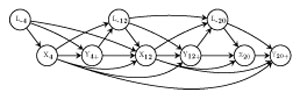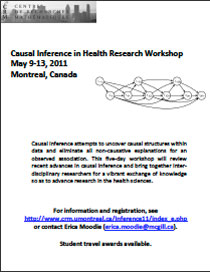Overview
Causal inference attempts to uncover the structure of the data and eliminate all non-causative explanations for an observed association. The goal of most, if not all, statistical inference is to uncover causal relationships, but it is not in general possible to conclude causality from standard statistical inference procedures, merely that the observed association between two variables is not due to chance. The need for causal inference procedures is apparent in many fields, but is perhaps most pressing in the field of health research, where quantifying the efficacy of new therapies, or uncovering the etiology of diseases, is often rendered complicated due to difficulties inherent in observational studies. Even in experimental studies, partial compliance to treatment regimens can compromise a well-designed experiment. The complexity of models, and corresponding inference procedures, is heightened in the context of longitudinal studies, where time-dependent confounding may be present. The purpose of this workshop is threefold: first, to review recent advances in the causal inferences in statistic; secondly, to bring together inter-disciplinary researchers including those from quantitative but non-statistical fields such as Economics and Computer Sciences, who work on causal inference methodology so that we may share approaches and knowledge to advance research in the health sciences; and finally, to increase the profile of causal inference amongst statisticians in Canada.


